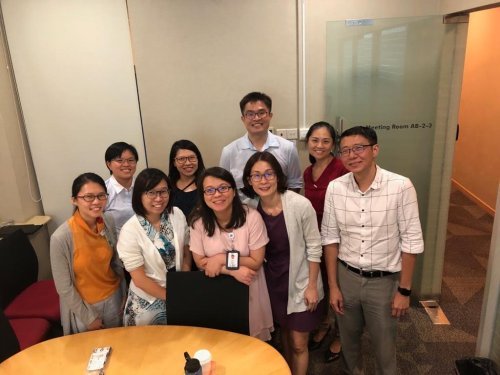The COVID – 19 pandemic has created unprecedented opportunities for us to rethink the way we deliver healthcare to our patients. In this Clinical Update series, PSS Hospital Chapter shares insights from pharmacists in the ambulatory care setting on the shift from face-to-face clinic consults to teleconsultation during this period. In the first part of this series, we are honoured to have Ms Cheryl Lim Yu Ling from Singapore General Hospital to share about her teleconsultation experience in the Rheumatology and Immunology clinic (RHI).
Providing Ambulatory Care During the COVID - 19 Pandemic
- Why is teleconsultation necessary in your area of practice?
RHI conditions require frequent monitoring just like other chronic medical conditions. This is compounded by these patients’ poor immunity with the use of long-term immunosuppressive medications, needing close monitoring for efficacy and safety. Teleconsultation is a convenient and safe way to reach out to these patients especially during this COVID-19 pandemic where unnecessary exposure of our immunocompromised patients to the public place them at great risk of serious sequel.
- Can you describe how teleconsultation is conducted in your area of practice?
Teleconsultation is used as a countermeasure to monitor patients remotely. Eligible patients are contacted by clinic staff via phone to explain the virtual clinic model and to obtain their consent for participation. If patients are agreeable, they are informed to have their blood test done on-site before the virtual appointment. The pharmacist on duty pre-clerks the case beforehand and reviews the blood test results. Patients are then contacted over the phone at the scheduled time to review their symptoms and whether they are experiencing any side effects from their medications.
Patients who are stable or require minor adjustments in medications will have their medications and blood test forms for the next visit sent via the Medication Delivery Service. Complicated cases such as those with disease flare, experiencing side effects or new symptoms will be discussed with the primary rheumatologist so that early investigations and appointments can be arranged.
- For teleconsultation to take place, were there eligibility criteria for the patients to meet?
Firstly, the patient’s medical condition must not be complex, as that requires close physician monitoring. Secondly, the patient must be willing to have follow-ups using the virtual model and have a contact number with which we can contact them.
- Did you face any challenges with the process of teleconsultation?
Some patients were afraid to leave their homes during the circuit breaker period to have their blood drawn on-site and requested for the pharmacist to top-up their medications without blood test results. The pharmacist would have to explain the need for blood tests monitoring, which could be stressful. It can also be hard to contact patients, requiring multiple calls before we can reach them.
Some of our elderly patients may not understand or forget that the visit is virtual, and will still physically turn up for their visits at the scheduled time. The pharmacist running the virtual clinic will have to see these patients on top of the patients scheduled for virtual consult. Patients may also forget their appointments for the virtual consult or on-site blood test. Rescheduling appointments and having unexpected patients turn up increase the overall workload and pharmacists may need to extend clinic hours to complete reviewing all patients.
Teleconsultation via phone calls can also be challenging if patients have physical symptoms. The pharmacist will have to share his/her contact number with the patient for them to provide photos for evaluation.
Teleconsultation can be more palatable for patients if the process and purpose is explained in detail and if they are reminded that the visit is virtual. The importance of on-site blood test should also be emphasised. Patients should also be screened for suitability (e.g. not hearing-impaired).
- Were there measures put in place to ensure protection of patient’s confidentiality during teleconsultation?
Patient’s identity (name) is confirmed over the phone before the consultation begins. If there is a primary carer who is not the patient, his/her name and relationship to patient will be documented on the clinical consult note for accountability.
- What training was provided for practitioners before embarking on teleconsultation and was it adequate?
As there was an urgent need for teleconsultation during circuit breaker, we had to initiate the RHI virtual clinic within a very short period of time. Hence, no formal training on teleconsultation was provided.We are glad that all of our RHI practitioners had prior experience with teleconsultation via the Medication Management Service and therefore were not unfamiliar.
Reflecting on this, healthcare providers providing teleconsultation can be given tips on telephone etiquette and how to manage difficult patients over the phone.
- Have there been any interesting encounters so far?
There was a patient with background psoriatic arthritis who claimed that he had “eczema” for a month. After extensive history taking, the patient was asked to send photos of his rash to the pharmacist. It was determined that this “eczema” was in fact, psoriasis. His dose of methotrexate was then increased after discussing with his Rheumatologist.
- Has teleconsultation changed the way you communicate with other healthcare professionals?
We have more frequent discussions on patient care issues. We also observed an increase in communication with the doctors using the TigerConnect phone application on top of phone calls.
- Beyond COVID-19, do you think teleconsultation will be here to stay?
With a resounding YES! Teleconsultation offers patient the convenience of consultation in the comfort of their home.

Cheryl (back row first from left) with the rest of RHI team mates in Singapore General Hospital
(Disclaimer: photo was taken prior to social distancing measures during COVID-19 pandemic)


